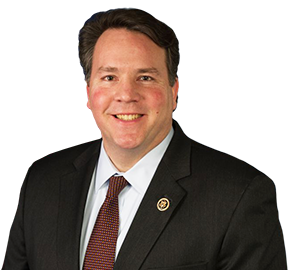As a U.S. representative for West Virginia's coal country, Alex Mooney said he frequently feels under siege from federal environmental regulations aimed at eventually phasing out one of his state's prime industries and traditions: coal mining.
Mooney, a Republican first elected in 2014, is particularly keen on one bill he's put forward: the Supporting Transparent Regulatory and Environmental Action in Mining Act.
As Mooney tells it, an Office of Surface Mining regulation due to go into effect in the coming weeks gives the federal government broad license to ban mining near anything it deems a body of water. Aimed at preserving lakes and rivers, Mooney anticipates the rule being abused by designating nearly anything as a "stream."
Mooney hopes to avoid implementation of this rule for two years, although he would accept one. His bill would require the OSM, part of the Department of Interior, to conduct a study of industry impact on OSM's dime.
"What President Obama is doing here is outrageous," Mooney told the Washington Examiner. "The Department of Interior has absolutely no authority from Congress to go underground — in the mines — and regulate little trickles of water.
"It's Congress' duty to provide an important check and balance against an out-of-control executive," Mooney said.
For Mooney, the Office of Surface Mining is a redundant body, undertaking duplicative work with the Environmental Protection Agency.
"The EPA already regulates the coal-mining industry," Mooney said. "On top of the EPA, you have a duplicative set of regulations coming from the Department of Interior. … I would think the EPA is more than sufficient, and frankly, the EPA is overdoing it as well."
On the Office of Surface Mining, "I frankly haven't looked that closely at all their functions, and see if all of them can be eliminated, or consolidated into other departments, but I know that they shouldn't be doing this," Mooney said.
Mooney was also one of the notable number of House Republicans who voted against December's "omnibus" that funded the government through September 2016.
The omnibus was pushed by leadership, but is unpopular in many sectors of the Right, and also apparently with Sen. Bernie Sanders. The independent democratic socialist from Vermont seeking the Democratic presidential nomination voted against the legislation. House Speaker Paul Ryan himself said "I hate omnibus bills," but had to succumb to political reality early in his speakership, and hopes for greater reform in 2016.
Mooney told the Examiner that he attempted to get the STREAM Act incorporated into the omnibus, but was unsuccessful. Had it been included, he would have considered voting for the legislation, but he also had concerns about the omnibus' funding of Planned Parenthood, for instance.
On Ryan, Mooney said, "We're giving him every benefit of the doubt. I do not think this was a good deal. … And my vote showed that."
Mooney said he doesn't just speak for himself, or his state, in his opposition to this Office of Surface Mining rule as-is, but that states all over the country "feel like they haven't been consulted." He said many members are disappointed in the administration's approach on these kinds of issues.
"Every Republican member of Congress from the state of Nevada voted against [the omnibus]," Mooney said. "And I can tell you, none of those guys are Freedom Caucus guys. They are very much 'mainstream Republicans.'
"There were land use issues that were lost in the omnibus," Mooney said.

